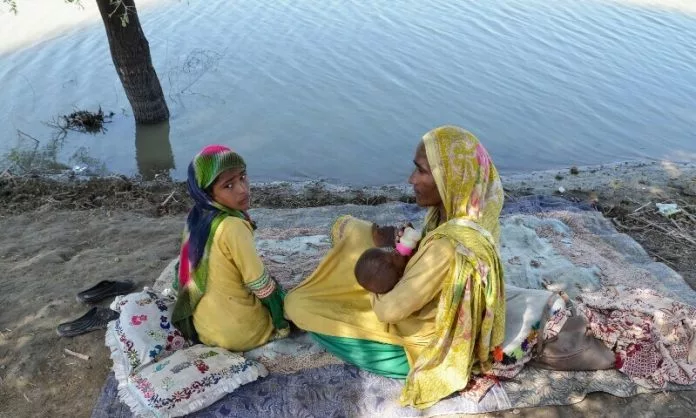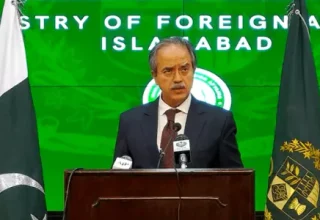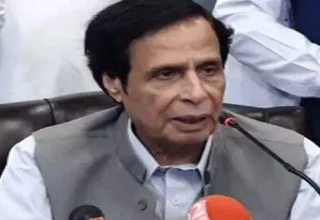
ISLAMABAD, Sep 23(ABC): The National Flood Response Coordination Centre (NFRCC) said on Friday that there was no shortage of food items in the country, as the death toll from devastating floods since June 14 crossed the 1,600 mark.
An intense and long monsoon dumped around three times as much rain on Pakistan than on average in recent weeks, causing major flooding which killed 1,606 people, including 579 children and 325 women, according to the National Disaster Management Authority (NDMA).
In its daily update, it said that 10 people have lost their lives in flood-affected areas, out of which six hailed from Balochistan and the remaining from Sindh.
This figure does not include those killed by disease in the aftermath.
Hundreds of thousands of people displaced by the floods are living in the open and as flood waters spread over hundreds of kilometres start to recede. The calamity has not just destroyed houses and roads but also crops spread over millions of acres subsequently creating fears of a food shortage.
In the latest update today, Pakistan’s top flood response centre said: “A huge stock of wheat for [the] next six months is available along with the strategic reserve which is sufficient till next harvesting season.”
Other than two million tons of strategic reserves, an import of additional stock of 1.8m tons is in progress out of which 0.6m tons has reached. The NFRCC said 46,000 tons of wheat from the public sector was being released on a daily basis.
The centre also gave a breakdown of certain crops and food stock.
It said that bumper tomato crops were harvested last year, which were more than sufficient to fulfil the country’s requirements. The NFRCC said a total of 7.5m tons of potatoes were harvested when the total requirement was 4.2m tons.
The forum said the import of onions and potatoes was in progress from Iran and Afghanistan. “In that regard, the government has directed to wave of all duties […] however the release/distribution of items is ensured [the] same day at earliest.”
The country’s rice requirement, the NFRCC said, could be fulfilled easily through available stock till December, adding that the next harvesting season would start in October.
In a nutshell, the country has a sufficient stock of food and sustenance items and measures have been taken to further enhance the capacity, the NFRCC said.
However, speaking to the media on the sidelines of the United Nations General Assembly, Finance Minister Miftah Ismail said that the country may have to import wheat if the crop was not sowed in time.
Later today, Prime Minister Shehbaz Sharif is expected to make his debut on the global stage with his address to a gathering of world leaders at the UN headquarters in New York.
He is expected to highlight the massive devastation triggered by deadly climate-induced floods, and will appeal for international support to deal with the catastrophe.
Deferral of recovery of agricultural loans
Meanwhile, at a meeting today, Minister for Water Resources Khursheed Shah said that he would talk to the prime minister about the deferral of the recovery of agricultural loans to farmers.
Later in the day, Sindh Information Minister Sharjeel Inam Memon said the same in a press statement.
He promised that steps were being taken to facilitate the farmers.
“In order to provide relief to farmers, the Sindh government has fixed the support price of wheat at Rs4000 per 40kg for the next year’s crop,” he said, adding that all resources were also being utilised to drain out water from agricultural lands so that farmers could resume sowing for the next year’s crop.
Disease spread in Sindh
The latest report by the Sindh Directorate General Health Services showed that 79,556 patients had reported to medical camps during the last 24 hours. Of these, 14,653 had diarrhoeal disease, 14,364 had skin-related diseases, 796 had malaria and 53 had dengue.
It said that in the last 24 hours, four people had lost their lives.
Since July 1, a total of 2.9 million patients have been treated at medical camps in the province
Meanwhile, in a meeting today, Sindh Chief Secretary Muhammad Sohail Rajput said that flood affectees in Sindh were at a risk of malaria, gastroenteritis and other diseases due to stagnant water.
He said that the federal cabinet had approved the procurement of six billion medicines for Sindh, adding that malaria and dengue kits were also being provided by the World Health Organisation (WHO).
“We have also decided to recruit 2,500 new doctors and paramedics who will work in the flood-hit areas,” Rajput said.
Water level in River Indus
The chief secretary also said that the water level in the Manchhar Lake had receded to 119 feet, while work on dewatering Dadu and Jamshoro was underway.
Separately, Memon said that the water level at two barrages of River Indus had fallen below 100,000 cusecs.
Guddu Barrage has recorded an inflow of 87,300 cusecs and an outflow of 76,000 cusecs, while inflow at Sukkur barrage has reached 92,200 cusecs and outflow is at 82,000 cusecs.
Memon said that the inflow at Kotri Barrage was 203,100 cusecs and the outflow was at 199,300 cusecs.
He added that the people affected by the floods had started to return to the areas where the water had been drained out.

























